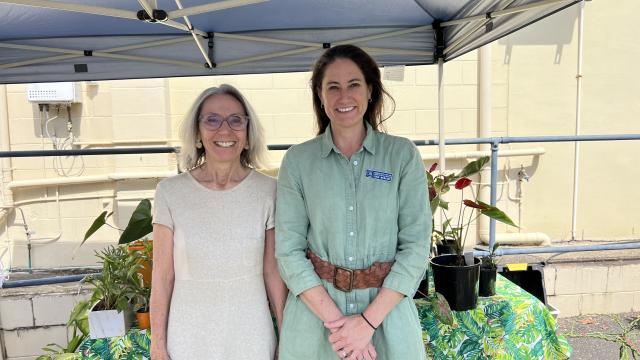“Single women over the age of 55 are the fastest growing demographic affected by homelessness in Australia. They have longer life expectancy, but on average have accumulated lesser levels of wealth.”
– Better Together Housing
“Family and domestic violence is the leading cause of homelessness for women and children.”
– Equity Economics, Nowhere to Go
Noosa Council just approved its Housing Strategy – Keep Noosa Home.
But does the strategy do enough to address the housing issues faced by vulnerable women?
According to the 2021 census, 12,947 women in Noosa Shire are over 55 – that is 45 per cent of females. This older demographic is forecast to increase over the next 20 years.
Meanwhile in its report Partnering for Impact, the Queensland Department of Housing and Public Works revealed that the number of Queensland women over the age of 55 seeking homelessness assistance increased by 21 per cent between 2011 and 2017. And since then the issue has been exacerbated with the Covid pandemic seeing house prices and rentals soar.
For these reasons, it was heartening that in December 2020, Noosa Mayor Clare Stewart succeeded in getting unanimous councillor support for addressing affordable housing.
Leigh McCready, president of the Tewantin Noosa CWA branch, has said, “Affordable housing is one of the key issues facing women in Noosa Shire, since house prices and rents have skyrocketed. Our CWA branch lost a wonderful contributing member because she could no longer afford to rent her Tewantin home.”
Tewantin Noosa CWA branch made a submission to Noosa Council’s draft Housing Strategy, emphasising the need for safe and secure housing for women, particularly those who are victims of domestic violence and older single women who are bereft of savings and superannuation.
So does Council’s new Housing Strategy address the housing needs of vulnerable women?
Of the 80 written submissions received by Council during its public consultation, 15.2 per cent urged housing support for older women and another 15.2 per cent flagged the need for housing for vulnerable groups/people in crisis.
But the 69-page consultancy report on the community’s feedback made scant reference to these issues – only one statement: “Those most in need of social and affordable housing in Noosa Shire were identified as being key workers, older women and vulnerable groups, or people in crisis receiving equal support (sic).”
As the Housing Strategy was prepared by Noosa Council’s town planning team, it is not surprising that it is mainly concerned with how town planning can facilitate more affordable housing in the Noosa Plan. Of its 48 recommended actions, 42 are about town planning or advocating about town planning policies, vis-à-vis other levels of government.
The Strategy does acknowledge that domestic violence victims have unmet housing needs, but older women ageing into poverty and homelessness get no mention.
Also, while Council’s Housing Stakeholder Reference Group includes homelessness support services and community housing providers, it has no representatives from Noosa women’s associations.
The Tewantin Noosa CWA branch asked to join the group to ensure women were appropriately advocated for but were advised that women were adequately represented by other agencies.
It is gratifying to find a number of Housing Strategy’s actions are relevant to addressing vulnerable women’s needs:
• A monitoring program to track supply of social housing, affordable housing, small dwellings, and accessible housing.
• Investigate Council-owned land for desperately needed and currently lacking housing such as social housing, affordable housing, or crisis accommodation.
• Support the community sector to review their land holdings for potential community housing or transitional/crisis accommodation.
• Support community initiatives to provide crisis accommodation and night shelter in existing buildings.
• Develop programs to encourage more efficient use of existing housing stock through sharing houses and encouraging secondary dwellings.
• Continue to work with the housing, homelessness and community service providers on wrap-around services for people at risk of homelessness.
• Review where relocatable home parks could be allowed, including tiny homes on state, council or community owned lands.
As the Housing Strategy is basically a town planning strategy, it does not consider whether council might provide or subsidise housing for the vulnerable. Nor has there been much mention of the crucial work of council’s dedicated community development team.
Council community development work is to be applauded and includes regular community roundtable meetings for social services providers and a social service hub at Tait-Duke Cottage, which brings together a number of not-for-profit organisations fortnightly with services for people facing hardship.
Also in February 2022, Council signed a Memorandum of Understanding (MOU) with community and affordable housing provider, Coast2Bay Housing Group, to collaborate and explore opportunities for social housing on council-owned land. This is included in the Housing Strategy.
Tewantin Noosa CWA vice president Ingrid Jackson stressed: ”The housing issues faced by vulnerable women have many layers.
“There are particular factors that push women into poverty including education inequity, the gender pay gap, pauses in paid work and careers to care for family, and inadvertent outcomes of government programs.”
“Whenever federal, state and local governments make policy decisions, we encourage them to consider the impacts on women.”
Noosa Council’s Housing Strategy has addressed strategic matters within council’s ambit, in particular, recommending changes to the planning scheme to facilitate affordable housing, and advocacy about federal and state government policies and programs.
But what needs further focus is the immediate need of low income or no income women to find somewhere safe to live, attainable rents, and preventing women falling into poverty and homelessness in the first place.
As an organisation with over 100 years of experience in supporting women and families, the Queensland Country Women’s Association stands ready to offer Noosa Council assistance at any point to advise on improving the housing options for Noosa women.









